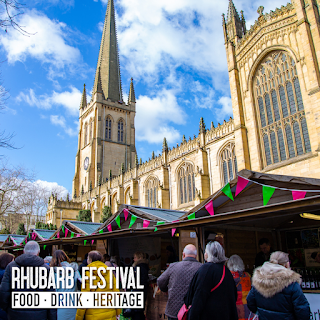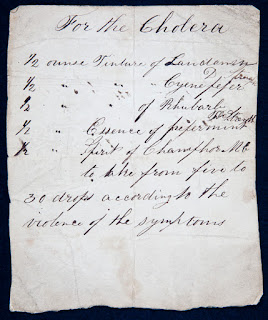Wakefield's annual Rhubarb Festival returns 16 to 18 February 2024!
But just why is Wakefield rooting for rhubarb? Allow us to explain...
Where does rhubarb come from?
Rhubarb root comes from Ancient China. It was originally powdered and used as a medicine. The type of rhubarb we eat and bake with today was introduced into England in the 1800s.
What was rhubarb used for?
As well as baking and eating, rhubarb was used in medicine for thousands of years. On display at Wakefield Museum we have this handwritten Cure for Cholera from the 1890s. It recommends a mixture of powdered rhubarb, laudanum, Cayenne pepper and peppermint to help relieve the symptoms of cholera.
Rhubarb was also made into botanically brewed drinks, carbonated water and homemade wines.
 |
| A bottle of rhubarb wine from 1886 - an extreme vintage! This is also on display at Wakefield Museum |
Where is the Rhubarb Triangle? Why is it called the Rhubarb Triangle?
The Rhubarb Triangle is the land between Wakefield, Leeds and Morley, famous for growing Yorkshire Forced Rhubarb. It is called the 'Rhubarb Triangle' as these three places form the three points of a triangle, within which the forced rhubarb is grown.
Why is Wakefield famous for rhubarb?
Thanks to good soil mixed with lots of ashes, horse manure and textile waste, and just the right amount of rain, Wakefield specialises in "forced rhubarb".
The forced rhubarb industry boomed from the 1880s. Low roofed forcing sheds built across the Rhubarb Triangle supplied the markets in London, and on to Europe. Special trains packed with rhubarb ran overnight between January and March.
.png) |
| Your little ones (and big kids too!) can help the Rhubarb Train make its deliveries on time at Wakefield Museum! Featuring artwork by local artist Liz Kay. |
What is Forced Rhubarb?
Forced rhubarb is a technique used to grow rhubarb out of season. The rhubarb roots are taken into warm, dark sheds lit with candles. These conditions encourage the rhubarb stalks to grow very quickly.
In 2010, Yorkshire Forced Rhubarb gained European protection. This gives it the same status and recognition as products like Parma Ham!
What does Forced Rhubarb sound like?
Forced rhubarb growing sounds like this. It's a lot noisier than you'd think!
What is the Rhubarb Festival?
The Rhubarb Festival is Wakefield's celebration of the city's most famous vegetable. It is one of the first food and drink festivals in the national calendar. There will be over 60 chalets selling local and regional rhubarb-based delights, a range of comedy and music events, and a series of workshops.
We are also hosting two workshops at Wakefield Museum, Foody Fun for Under 5s on Thursday 16 February and Let's Make Rhubarb Crumble! on Friday 17 February.
Where does the phrase "rhubarb, rhubarb, rhubarb" come from?
When extras and background characters on film and stage sets needed to create the impression of conversation, they would repeatedly say "rhubarb, rhubarb, rhubarb" out of time with one another. This created background noise that couldn't be understood over the main dialogue, and looks like natural conversation!
Where can I find out more about rhubarb?
We celebrate rhubarb all year round with a dedicated display at Wakefield Museum. See objects from the city's rhubarb-growing past, listen to the sound of forced rhubarb and make the Rhubarb Train get to its deliveries on time!
Wakefield Museum is free entry, and is open:
| Monday | 9am - 5pm |
| Tuesday | 9am - 5pm |
| Wednesday | 9am - 7pm |
| Thursday | 9am - 7pm |
| Friday | 9am - 5pm |
| Saturday | 9am - 4pm |
| Sunday | Closed |



.jpg)

.png)
No comments:
Post a Comment
We would love your comments - though they may take a day or two to appear.